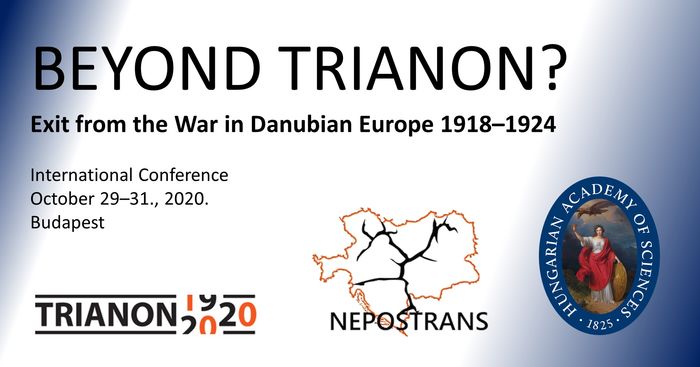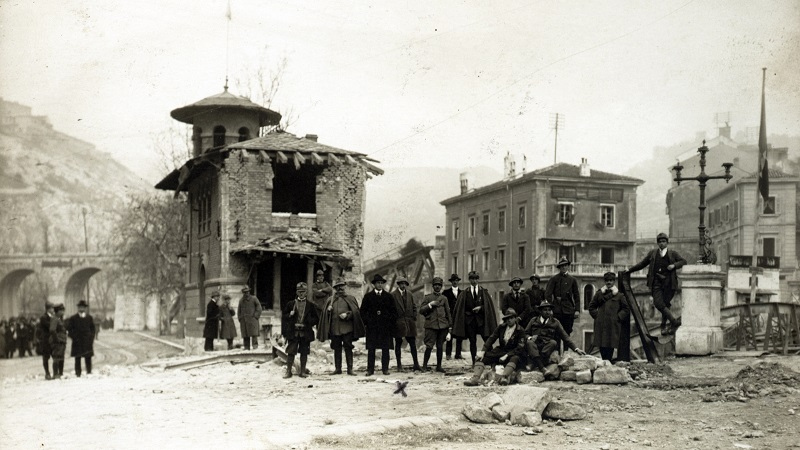Kollégánk, Révész Tamás Heroic borderlands and loyal minorities? National (?) mobilizations in the contested borderlands of Austria and Hungary című előadása a konferencia első napján lesz hallható. A rendezvény első két napja a Tóth Kálmán utcai Humán Tudományok Kutatóházában, az utolsó pedig a Villányi úti Konferenciaközpontban zajlik.
A SZEMÉLYES ÉS ONLINE RÉSZVÉTEL EGYARÁNT REGISZTRÁCIÓHOZ KÖTÖTT, a résztvevők száma a járvány miatt korlátozott (a Humán Tudományok Kutatóházában maximum 20, a Villányi úton maximum 30 fő lehet jelen, maszk használata kötelező). A regisztrációs űrlap elérhető itt.
A konferencia programja
October 29th, 2020.
ELRN HTK 1097 Budapest, Tóth Kálmán u. 4.
Room 13–14
10:30 Opening of the conference:
Tamás Freund, Chairman, Hungarian Academy of Sciences
Attila Zsoldos, Chairman, Section of Philosophy and Historical Sciences of the Hungarian Academy of Sciences
Panel 1
11:00 Béla Bodó (Univ. Bonn): Action and reaction: the shared roots and the divergent causes of the red and white terrors
11:25 Tamás Révész (ELRN Center for Humanities, Trianon100): Heroic borderlands and loyal minorities? National (?) mobilizations in the contested borderlands of Austria and Hungary
11:50 Ivan Jeličić (post-doctoral reseracher, ERC Nepostrans, Univ. Rijeka): In the Name of the “True Fiumians“, Autonomist-Democrats as Challengers to Local Elite Nationalistic Logics
12:15 Discussion
Lunch
Panel 2
13:30 Gergely Hubai (Univ. of Theatre and Cinema, Budapest): Visible man-Invisible film: The post-Trianon reconstruction of the Hungarian film industry
13:55 Edina Gál (Univ. Babeș-Bolyai, Cluj-Napoca/Kolozsvár): Orphaned, abandoned, denationalized: The takeover of the State Children’s Asylums after 1918
14:20 Julia Bavouzet (visiting post-doctoral fellow, Inst. für Österreichische Geschichtsforschung, Vienna): State transformation in post-Habsburg Hungary. The ministry of the interior and its personnel (1918-1920)
14:45 Discussion
Break
Panel 3
15:30 Elisabeth Haid (post-doctoral reseracher, ERC Nepostrans, Vienna): State building and local politics in Eastern Galicia
15:55 Oliver Pejić (PhD student, EUI, Florence): The persistent appeal of “unnatural” identities in interwar Yugoslavia: A look at the lower Styria’s “German- oriented Slovenes”
16:20 Ségoléne Plyer (assoc. professor, Univ. Strasbourg, senior researcher, ERC Nepostrans): The Faltis heirs and the liberal paradox. Buying flax and processing linen in Bohemia, 1914-1928
16:55 Discussion
Break
Keynote speech
17:30 Pieter M. Judson (professor, EUI, Florence): “Rethinking the Postwar from Above and Below: 1918-1923”
October 30th, 2020.
ELRN HTK 1097 Budapest, Tóth Kálmán u. 4.
Room 13–14
Keynote speech
10:00 Ignác Romsics (professor, Károly Esterházy Univ., Eger, member of the Hun. Academy of Sciences): Le passé qui ne passe pas. The Treaty of Trianon and its Repercussions
Panel 4
11:10 Máté Rigó (assist. professor, Yale-NUS, Singapore): Keynes in the archives. The economic consequences of the peace and the Great War
11:35 Gabriel Godeffroy (Univ. Pathéon Sorbonne – Paris 1): Elemér Hantos and the monetary problems in Hungary and Central Europe (1918-1924)
12:00 Gabriel Farquet (fellow, Wilson Center, Washington): Gold magnets: League of nations’ stabilization loans and foreign influence in Austria and Hungary
12:25 Discussion
Lunch
Panel 5
13:55 Balázs Juhász (assist. professor, ELTE, Budapest): The aeronautical control of Hungary after WWI
14:20 Aliaksandr Piahanau (post-doctoral fellow, Univ. Padua): “Each wagon of coal should be paid by territorial concessions”: Hungary, Czechslovakia and the coal shortage, 1918-1921
14:45 Discussion
Break
Panel 6
15:30 Jernej Kosi (post-doctoral researcher, ERC Nepostrans, Univ. Ljubljana): Local elites in Prekmurje in the Interwar Period: Continuities and Ruptures
15:55 Anikó-Borbála Izsák (junior reseracher, ERC Napostrans, ELTE, Budapest): Change and continuity among the economic elite of Baia Mare in the 1920s
16:20 Christopher Wendt (junior reseracher ERC Nepostrans, EUI Florence): With God into the New Era”: Catholic Politics in North Tyrol after the First World War
16:55 Discussion
October 31st, 2020.
Villányi úti Konferenciaközpont, 1113 Budapest, Villánnyi út 11-13.
Room 300
Panel 7
11:00 Sebastian Paul-Ramisch: Transformation of different speeds. A comparison of the former Hungarian and then Czechoslovak provinces Orava and Subcarpathia in the period from 1918 to 1924
11:25 Károly Ignácz (senior reseracher, ERC Nepostrans, Inst. of Political History, Budapest): Local Representatives in one of the Suburbs of Budapest before and after the WWI: the Continuity of the Liberal and Social Democratic Political Elites in Erzsébetfalva?
11:50 Viktoriya Serhiienko (researcher, Institute of Ukrainian Archeography and Source Studies of the National Academy of Sciences of Ukraine): Establishing border between Slovakia and Rusinsko after the WWI: international, national and regional aspects
12:15 Discussion
Lunch
Panel 8
13:30 Sandra Panzner (Univ. Erlangen): Trianon and the Theatre – On the form and function of a cross-border discourse space
13:55 Pál Hatos (director, Institute for Central Europe at the József Eötvös Research Center of the National Univ. of Public Service, Budapest): Messianic hopes-wordly defeats. Revolution and secular religion after WWI in Hungary
14:20 Lili Zách (Maynooth University Arts and Humanities Institute, Associate Member): Beyond borders and identities: Irish nationalist images of the Treaty of Trianon, 1920-1939
14:45 Discussion
Break
Panel 9
15:30 Marco Bresciani (Univ. Florence): The “hidden psychic and economic bonds” between Austria-Hungary and Italy and the post-Habsburg Trieste culture (1918-1926)
15:55 Gábor Egry (ERC Nepostrans, Inst. of Political History): What is a local business elite on a periphery? The Sothern Banat’s economy in transition
16:20 Kathryn Densford (Elisabethtown College): Beyond Bohemian state rights: the lower Austrian towns that became Czech
16:55 Cody James Inglis (junior researcher, ERC Nepostrans, CEU Vienna-Budapest): Brutalization and Overlapping Authority: Provincial Administration, Political Elites, and the Exit from War in Southern Moravia and Northern Lower Austria
17:20 Discussion

A címképen: Fiume 1919-ben, jobbra a lerombolt közúti híd, háttérben középen a lerombolt vasúti híd a Recsina folyó felett. Forrás: fortepan.hu, adományozó: Schmal Alexandra.






